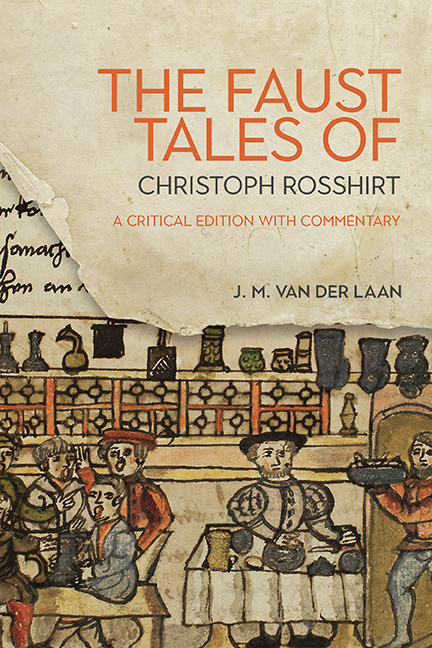Introduction: Faust, Christoph Rosshirt, and His Manuscript
Published online by Cambridge University Press: 03 September 2019
Summary
Faust
SINCE HIS FIRST appearance in the sixteenth century—the age of Martin Luther and other Reformers of the Christian church such as John Calvin, Ulrich Zwingli, Menno Simon, Jan Łaski, Thomas Cranmer, and John Knox—Faust, along with the theological questions his story raised, has fascinated audiences and readers. The name Faust was first associated with a ne'er-do-well vagabond, con artist, or magician engaged in the black arts who had dealings with a or the devil. References to the name Faust begin in the first decade of the 1500s, remain sparse over the course of the first half of the century, but then increase and take on form and substance in short tales about his exploits and, by the end of the century, finally come together in novelistic narratives with a well-conceived beginning, middle, and end. At the cusp of this final stage stands a small collection of stories about this legendary figure composed in manuscript by a man named Christoph Rosshirt. His tales are by far the longest and most elaborate narratives about Faust before the novelistic books appeared, and they represent an unprecedented contribution to the Faust tradition.
Faust—or, better yet, Doctor Faust—is best known as the reprobate who consorted with and consigned his soul to the devil. He is best known in this way, because in 1587 his whole story, the Historia von D. Johann Fausten / dem weitbeschreyten Zauberer vnnd Schwartzkünstler (The History of Dr. Johann Faust, the infamous Magician and Necromancer), a fully fleshed-out Faust narrative written by an anonymous author and published by Johann Spies in Frankfurt am Main, appeared for the first time in print. Thanks to print, the story could spread as never before, and it did. Within a few years—in fact, by 1588—it had been translated into English (though no copy of this edition is extant), and by 1589 Christopher Marlowe's play The Tragicall History of D. Faustus had been performed onstage (though it was not published until 1604). In the following centuries, Faust never left the stage, so to speak, and Johann Wolfgang Goethe gave the world his Faust (Part I published in 1808, Part II in 1832), the version that would come to be most prized and most famous.
- Type
- Chapter
- Information
- The Faust Tales of Christoph RosshirtA Critical Edition with Commentary, pp. 1 - 18Publisher: Boydell & BrewerPrint publication year: 2019



